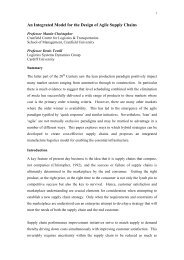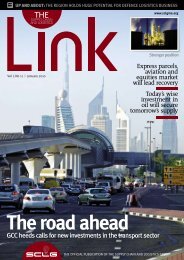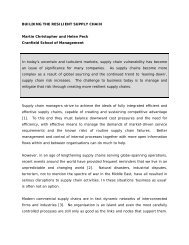Free to Download - SCLG
Free to Download - SCLG
Free to Download - SCLG
Create successful ePaper yourself
Turn your PDF publications into a flip-book with our unique Google optimized e-Paper software.
News<br />
INTERNATIONAL<br />
West-<strong>to</strong>-East VLCC<br />
trade picks up<br />
West-<strong>to</strong>-East VLCC (very large<br />
crude carrier) trade is gaining<br />
momentum contributing <strong>to</strong><br />
almost 16.8 per cent of overall VLCC<br />
demand in 2009, compared <strong>to</strong> 13 per cent<br />
the previous year. VLCCs saw 39 per cent<br />
increase in demand in West Africa and<br />
India trading and 35 per cent gain in<br />
Americas and Asia trades, offsetting the<br />
losses on other major trades, US-based<br />
analyst McQuilling reported.<br />
The popularity of the West-<strong>to</strong>-East<br />
trades that gained momentum through<br />
2009 has provided signifi cant <strong>to</strong>nne-mile<br />
demand for an otherwise over-supplied<br />
VLCC market, said the report published last<br />
week. According <strong>to</strong> analysts, the crude oil<br />
trades in particular from West Africa and the<br />
Americas <strong>to</strong> India and the Far East, have<br />
seen year-on-year growth that <strong>to</strong>ok off in<br />
the fourth quarter and prompted a rally in<br />
the spot freight rates that has yet <strong>to</strong> fi zzle<br />
out. “As these trades continue <strong>to</strong> consume a<br />
greater portion of the fl eet, losses on other<br />
major trades are largely being offset by this<br />
long-haul’s emergence.”<br />
“With updated data refl ecting actual<br />
<strong>to</strong>nne-mile demand through 2009, we were<br />
able <strong>to</strong> validate our commentary regarding<br />
changing VLCC trading patterns,” it added.<br />
The traditional “front-haul” TD1, moving<br />
crude between Arab Gulf and US Gulf, lost<br />
more than 28 per cent of its demand since<br />
2008, slipping from a 16.4 per cent share<br />
of <strong>to</strong>tal VLCC business <strong>to</strong> 12.2 per cent in<br />
2009. Besides, the TD4 trade from West<br />
Africa and the US lost 28 per cent of its<br />
demand, emphasizing the detrimental<br />
impact of the US recession on domestic<br />
liquid fuels imports.<br />
In contrast <strong>to</strong> these losses, VLCCs, the<br />
report said, saw an increase in West Africa<br />
and India trades, Americas and Asia trades,<br />
and West Africa and Asia trading (12 per<br />
cent). These traditional “back-haul” West-<strong>to</strong>-<br />
East trades combined <strong>to</strong> take a 16.8 per cent<br />
share of VLCC demand in 2009, up from a<br />
13.3 per cent share in 2008.<br />
“These results lead us <strong>to</strong> question the<br />
industry’s definition of the ‘front-haul/backhaul’,<br />
highlighting that TD1 now commands<br />
a lesser share of VLCC demand than the<br />
West- <strong>to</strong>-East trades at 12.2 per cent<br />
versus 16.8 per cent. To be fair, most of<br />
North America was mired in recession last<br />
year while economies in the East continued<br />
<strong>to</strong> grow,” it said.<br />
Although the hard demand data for<br />
2010 is not yet available, the analysts said<br />
they can attest <strong>to</strong> the West-<strong>to</strong>-East trade’s<br />
growing resilience given current spot fi xture<br />
records. “We track VLCC fi xtures on these<br />
routes up 92 per cent year-<strong>to</strong>-date from the<br />
same period last year. This points <strong>to</strong> the<br />
growing demand for liquid fuels in China and<br />
India, along with expansions <strong>to</strong> Reliance’s<br />
refi neries whose Jamnagar complex now<br />
boasts the world’s largest capacity at 1.24<br />
million barrels per day,” it added.<br />
May 2010 Link 53

















